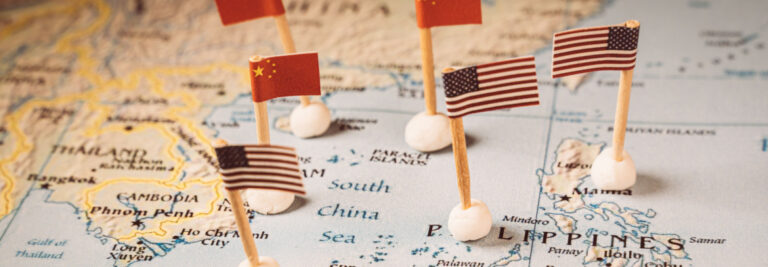From March 4 to 11, the annual dual meetings of China’s legislature, the National People’s Congress (NPC, 全國人民代表大會), and the Chinese People’s Political Consultative Conference (CPPCC, 中國人民政治協商會議), a nominal political advisory body, were held concurrently in Beijing. Commonly known as the “Two Sessions,” or Lianghui (兩會), this national political event provides an official review of the preceding year, as well as setting an agenda—political, economic and military—for the year ahead. While setting an agenda on China’s economic growth and development was the priority, the other aspect that calls for attention is the discussion on Taiwan—a matter of particular note this year, given a marked shift as the Chinese Communist Party (CCP) adopted a tougher tone on Taiwan.
Language on Taiwan in the 2024 Government Work Report
Delivering his first Government Work Report before the NPC since taking office in 2023, Chinese Premier Li Qiang (李强) categorically stated:
We [China] will implement our Party’s overall policy for the new era on resolving the Taiwan question, stay committed to the one-China principle and the 1992 Consensus, and resolutely oppose separatist activities aimed at “Taiwan independence” and external interference.
We will promote the peaceful development of cross-Strait relations, be firm in advancing the cause of China’s reunification, and uphold the fundamental interests of the Chinese nation. By advancing integrated cross-Strait development, we will improve the wellbeing of Chinese people on both sides so that together, we can realize the glorious cause of national rejuvenation.
Compared to previous NPC work reports (see here and here), this report marked a noted shift in that the earlier language of “peaceful reunification” was replaced by being “firm in advancing the cause of China’s reunification.” While the “peaceful development of Cross-Straits relations” was mentioned, “peaceful reunification” was replaced with an emphasis on “China’s reunification.” The omission of the word “peaceful” in the context of “reunification” highlights a significant change in China’s outlook on Taiwan—demonstrating CCP’s hardened stance on Taiwan, where conciliation is no more a part of Beijing’s Taiwan dictionary. This brings into the picture a greater possibility of the use of force by China for the purposes of “reunification.”

Image: PRC Premier Li Qiang (background, center left) chairs a plenary meeting of the PRC State Council to “discuss” the contents of the annual government work report, prior to its presentation at the National People’s Congress (February 18, 2024). (Image source: PRC State Council)
In regards to Taiwan, the crucial concern for the People’s Republic of China (PRC) is the de jure political status of the island. After 1949 the PRC maintained a formal policy asserting the need for the “liberation of Taiwan”—which until at least 1955, was understood to mean the use of force. But significant developments in the 1950s—including the partition of Korea, the signing of the US-Taiwan defence treaty, the Geneva Agreements on the partition of Vietnam, and the establishment of the Southeast Asia Treaty Organization (SEATO)—forced China to abandon, at least temporarily, any such goal. Between 1958 and 1979, with the shift in the PRC’s international status with its increasing recognition as the government of China and replacement of the Republic of China (ROC) at the United Nations, China’s position on Taiwan witnessed a shift from “liberation” to that of “reunification.” However, in recent times, the phrase “peaceful reunification” has been replaced with “reunification”—a narrative message further confirmed by the 2024 Government Work Report.
Other Commentary at the “Two Sessions”
Upholding the tough tone, speaking at a press conference during the two sessions, Member of the Political Bureau of the CCP Central Committee and PRC Foreign Minister Wang Yi (王毅) sent a warning message, stating that:
Whoever engages in Taiwan independence activities on the island will be held accountable by history and whoever in the world connives at and supports Taiwan independence will get burned for playing with fire and taste the bitter fruit of their own actions.
All people of Chinese descent should uphold the overall interests of the Chinese nation, jointly oppose “Taiwan independence,” and support peaceful reunification.
The PRC’s hardened position and firmer language on Taiwan can be read under two explanations. The first of these is a reaction against the victory of William Lai (賴清德) of the ruling Democratic Progressive Party (DPP) in Taiwan’s January 2024 elections. Given the DPP’s traditional pro-independence outlook, its political control over Taiwan goes against Beijing’s goal of “reunification.” Acting indifferent to the outcome of the elections, Chen Binhua (陳斌華), a spokesperson for the State Council Taiwan Affairs Office, stated that:
[T]he elections will not change the basic landscape and development trend of cross-Strait relations, will not alter the shared aspiration of compatriots across the Taiwan Strait to forge closer ties, and will not impede the inevitable trend of China’s reunification.
Other Factors Outside “Two Sessions” Discourse Further Indicate a Harder Line
The tough talk on Taiwan during the Two Sessions also coincides with rising tensions in the Taiwan Strait against the backdrop of China’s intensified coast guard patrols. These patrols were stepped up following an incident on February 14, involving a pursuit by Taiwan’s coast guard of a Chinese fishing craft, which the coast guard accused of trespassing in waters off the Kinmen Islands (which stand opposite the city of Xiamen, in China’s Fujian Province.). Two of the four Chinese fishermen died after their boat capsized during the pursuit, leading to increased PRC Coast Guard presence and harassment of Taiwan vessels in the area. (Editor’s note: For a fuller discussion of these incidents and their significance, see “Decoding Beijing’s Gray Zone Tactics: China Coast Guard Activities and the Redefinition of Conflict in the Taiwan Strait” by Sze-Fung Lee, elsewhere in this issue.)
Noting that the incident has “hurt the feelings of compatriots on both sides of the Taiwan Strait,” Zhu Fenglian (朱鳳蓮), spokesperson for the Taiwan Affairs Office of the PRC State Council, stated that “Both sides of the Straits belong to one and the same China, and Taiwan is an inalienable part of China’s territory.” Following this, China’s Coast Guard launched regular law enforcement patrols in the waters of the Xiamen-Kinmen area, as part of Beijing’s declared efforts to protect fishermen’s lives and property. For its part, Taiwan has urged Beijing to refrain from changing the “status quo,” stating that: “The current situation across the Strait should be controllable,” and “We don’t want to see any action that breaks the status quo.”
In addition to narrative messaging, the Taiwan factor also looms large in explaining China’s defense spending as announced during the Two Sessions. The 14th NPC announced an annual defense budget of 1.67 trillion yuan (about USD $231.36 billion) for the fiscal year 2024, which represents an increase of 7.2 percent from 2023. This marks the ninth consecutive single-digit increase in China’s defence spending since 2016 (with the last double-digit jump of 10.1 percent recorded in 2015). In the interim, the PRC’s estimated yearly military budget increases have been: 7.6 percent in 2016, 7 percent in 2017, 8.1 percent in 2018, 7.5 percent in 2019, 6.6 percent in 2020, 6.8 percent in 2021, 7.1 percent in 2022 and 7.2 percent in 2023 respectively. The percentage rise in 2024 is the same as that of last year (7.2 percent), and the third time in a row since 2022 that the rate increase has stood above 7 percent. One of the many reasons behind the increase in defence spending is the escalating geopolitical tensions with the United States over Taiwan.
This is further linked to Washington’s defense assistance to Taipei. For instance, in February 2024 the US government approved an arms sale valued at USD $75 million to Taiwan—the 13th such arms sale authorized by US President Joseph Biden’s administration since 2021. In its press release, the Pentagon’s Defense Security Cooperation Agency stated that the package would include “cross-domain solutions; high-assurance devices; [GPS] receivers; communications equipment […] technical services; and other related elements of logistics and program support,” with a categorical mention that:
The proposed sale will improve the recipient’s [Taiwan’s] ability to meet current and future threats by enhancing communications and network security, and providing infrastructure to allow the secure flow of tactical information.
It is therefore clear to China that any use of force against Taiwan will draw a strong reaction from the United States.
Conclusions
A policy of talking tough on Taiwan highlights Beijing’s concerns—in particular, that the DPP, with its orientation towards independence, has the potential to create its own international space independent of the PRC’s “One-China Principle.” Beijing’s hardening position is the result of frustration with the lack of progress towards “reunification” on Beijing’s terms. It is also a component of the PRC’s overall strategy—one in which, regarding the Taiwan issue, China cannot afford to have a “loss of face.” The messaging from the 2024 Two Sessions is likely indicative of a hardline policy that will continue to play itself out in other areas in the year ahead.
The main point: The victory of the DPP for the third time and Taiwan’s presidential election constitutes a fundamental challenge to Beijing’s long held ambition of “reunification” with the island. Beijing’s increasingly tough stance on Taiwan, as seen in the messages emerging from the annual “Two Sessions,” is not just rhetoric—it represents a more aggressive posture as demonstrated in China’s actions.




